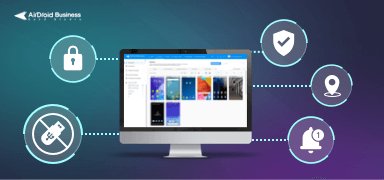5 Best MDM Software Solutions - Pick One for Logistics Business
Here in this article, we’ll review together the tricky issues that managers in the logistics and transportation industry often encounter when choosing a suitable MDM solution. After that, we’ll directly provide reviews of 5 best MDM software for your reference.

Part 1 : Key Considerations in MDM Software Selection for Logistics
We conducted thorough research on MDM logistics pain points across platforms like Reddit, Spiceworks, G2, and more. Based on user feedback, we found 5 key considerations when selecting MDM software for logistics: cost, integration, security, ease of use, and scalability.

1Are there high costs or hidden fees?
Cost is often a critical factor for logistics companies managing a large mobile device fleet. Many users have reported hidden fees or overpriced solutions. To avoid unexpected expenses, look for transparent pricing models and consider free trials to understand the true cost of the solution.
2How well does the MDM integrate with logistics operations?
MDM solutions should easily integrate with existing logistics systems like ERP and inventory management software. MDM for transportation or logistics operations must support cross-platform compatibility for Android, iOS, and Windows devices commonly used in logistics.
For example, if an MDM solution doesn’t integrate properly with an existing inventory management system, it could lead to delays in updating stock levels or syncing delivery data. This means warehouse staff might be unaware of changes in stock, leading to mistakes in shipments or delays in processing orders.
Hence it’s important to select an MDM that seamlessly integrates with your tools.
Besides, the MDM should support cross-platform compatibility for Android, iOS, and Windows devices commonly used in logistics.
3How does the MDM protect logistics security and privacy?
Security is a top concern, especially with BYOD policies and handling sensitive logistics data. An MDM should include features like remote wipe, geofencing, and device encryption to protect data on lost or stolen devices. Ensuring compliance with industry regulations (e.g., GDPR) is also crucial for safeguarding privacy, especially for transportation logistics where customer data is involved.

4Is it complicated to set up or use?
MDM software should be easy to deploy and manage without extensive training. Many logistics professionals complain the complexity of solutions like Intune, which require specialized knowledge.
Picture this, a logistics fleet manager needs to spend significant time learning how to use the MDM to centrally manage mobile devices—this can dampen their work enthusiasm and productivity.
A user-friendly, intuitive platform requiring no complicated skills with clear enrollment tutorial will reduce setup time and improve daily use.
5How scalable is the solution to support logistics growth?
As logistics operations grow, so does the need for scalable mobile device fleet management. Many MDM solutions struggle with handling large fleets or expanding operations. Choose an MDM (check our MDM software comparison below) that can grow with your business, supporting additional devices and locations without compromising performance.
Based on the above considerations, we have evaluated and selected 5 of the best MDM solutions for your reference, just keep exploring.
Part 2 : 5 Best MDM Solutions Reviews
- Miradore - Best for Comprehensive MDM Functions
- AirDroid Business - Best for Cost-effective & Android-focused Needs
- SOTI Mobicontrol - Best for Mixed-device Environments
- Workspace ONE UEM - Best for Large-scale Companies Requiring Advanced MDM
- Mosyle - Best for Apple-only Device Fleets
1Miradore
Overall, Miradore is a comprehensive MDM solution that is especially useful for industries like transportation. It helps logistics companies stay compliant with emerging regulations, such as the U.S. electronic logging device (ELD) rule. Miradore is known for secure data management and remote device control, making it an ideal choice for logistics operations.
| Official website: | https://www.miradore.com/ |
| Pricing: | Starts from $2.75 per device/month after 14-day trial |
| Supported Operating Systems: | Android, iOS, macOS, and Windows |
✅ Pros
- Secure device management with passcodes, encryption, VPN enforcement, and remote wipe
- Supports compliance with industry regulations, including ELD
- Automatic app and setting installation using user profiles (via Apple DEP or Android Enterprise)
- Location tracking and ability to lock or wipe devices remotely
❌ Cons
- While Miradore offers a free version, it is limited to managing up to 50 devices and has fewer features
- Users on Reddit have reported that the support can be slow to respond
- Miradore tends to lose contact with enrolled devices, forcing wipe-and-re-enroll
2AirDroid Business
If your logistics fleet heavily relies on Android devices, then AirDroid Business is definitely your perfect choice. AirDroid Business is the most cost-effective MDM solution focused on managing Android and Windows devices. It is particularly well-suited for logistics companies with large fleets of Android-based devices like barcode scanners, tablets, and rugged devices.
More than that, AirDroid Business provides an intuitive interface and helps clients enroll target devices easily (via Device Owner/Android Enterprise/Zero Touch/Samsung KME/Regular enrollment); administrators can enroll devices in batches without effort.
| Official website: | https://www.airdroid.com/business/ |
| Pricing: | Provides free trial & Starts from $1 per device/month (contact sales for greater discount) |
| Supported Operating Systems: | Android, Windows |
✅ Pros
- Most budget-friendly, yet comprehensive
- User-friendly interface, easy to deploy
- Strong real-time monitoring and remote management capabilities
- Advanced security features such as remote wipe and geofencing
- 24/7 customer service support; provide timely answers to any trial or functional questions
❌ Cons
- Limited iOS support (iOS management not available for now)
- Integration limitations with more enterprise-focused systems
- The total file size cannot exceed 1 GB while transferring bulk file
3SOTI Mobicontrol
SOTI Mobicontrol is a versatile MDM solution that excels in managing a variety of devices, including Android-based handheld scanners commonly used in logistics. It’s especially useful for operations with mixed-device environments.
| Official website: | https://soti.net/solutions/mobile-device-management/ |
| Pricing: | Starts from $4 per device/month for Cloud system |
| Supported Operating Systems: | Android, iOS, macOS, and Windows |
✅ Pros
- Supports a wide range of devices, including rugged devices
- Advanced real-time monitoring and location tracking
- Strong geofencing capabilities to ensure devices are used within defined areas
- Works well in mixed-device environments (Android, iOS, Windows)
❌ Cons
- Higher price point than some other solutions, making it less ideal for smaller logistics operations
- The API is usually difficult to work with
- Clunky interface & lack of verbose logging
4Workspace ONE UEM
Workspace ONE UEM is an enterprise-level MDM solution suited for large logistics organizations managing a global fleet of devices. It offers seamless integration with enterprise systems, such as ERP and SAP.
| Official website: | https://www.omnissa.com/products/workspace-one-unified-endpoint-management/ |
| Pricing: | Starts from $3.78 per device/month |
| Supported Operating Systems: | Android, iOS, macOS, and Windows |
✅ Pros
- Enterprise-level features for complex logistics environments
- Great for large-scale device management, ideal for companies with a global logistics fleet
- Integrates well with existing enterprise software
- Strong security policies, app deployment, and data protection
❌ Cons
- Expensive, typically suited for large enterprises
- Complex setup and management (including custom roles and initial deployment), requiring IT expertise
- Overkill for smaller logistics operations with fewer devices
5Mosyle
Mosyle is an MDM solution designed primarily for managing Apple devices, such as iPads and Macs, making it an ideal choice for logistics operations that rely heavily on these devices for tasks like inventory tracking, delivery confirmations, and warehouse management.
| Official website: | https://business.mosyle.com/ |
| Pricing: | iOS, iPadOS & visionOS – from $1.5/device/month; macOS – from $3/device/month |
| Supported Operating Systems: | iOS, macOS, iPadOS, tvOS, Apple Watch |
✅ Pros
- Free for up to 30 devices, making it perfect for small logistics teams with simple needs
- Intuitive and easy-to-use interface with minimal training required
- Provides basic security features, including app management and device locking
❌ Cons
- Resetting passwords on devices that are offline can be problematic
- Limited features compared with other MDM solutions
Part 3 : FAQs About MDM Software for Logistics
- Electronic Logging Device (ELD) rule in the U.S. for tracking drivers' hours.
- GDPR (General Data Protection Regulation) for companies handling personal data, especially when it comes to tracking shipments and handling customer information.
- Other industry-specific regulations, such as FEDRAMP for federal agencies, ensuring that MDM solutions comply with security standards.
- Device compatibility across different mobile operating systems (Android, iOS, Windows).
- Managing a large fleet of devices in multiple locations, leading to difficulties in scaling MDM solutions.
- Ensuring consistent security across devices, including device enrollment, remote wipe, and compliance management.
- Integration issues with existing systems, such as ERP or CRM.
- Device Grouping and Organization: Group devices by function or location for better management. For example, create groups like "Warehouse A" or "Delivery Trucks" for easy access and monitoring.
- Security and Compliance: Implement conditional access policies to ensure only compliant devices can access company data. Use frameworks like Zero Trust to minimize security risks.
- Automated Device Enrollment: Utilize systems like Google Zero-Touch Enrollment for automatic device enrollment, ensuring quick and seamless onboarding of new Android devices.
- API Integrations: Leverage open APIs for seamless integration between MDM solutions and other logistics systems (e.g., ERP, inventory management).
- Regular Monitoring and Updates: Continuously monitor devices in real time and ensure regular updates are applied to address security vulnerabilities and improve performance.







Leave a Reply.